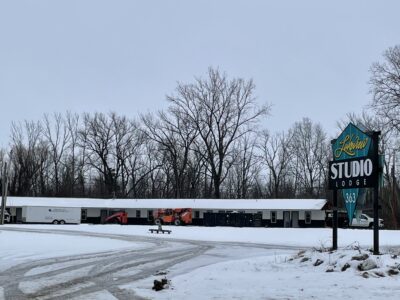Local truck companies experience some changes

Refrigerator trucks at Agricultural Transport sit idly by, waiting to haul freight throughout the country. Submitted Photo.
A lot has changed in the last few weeks surrounding the coronavirus pandemic. Many are working from home, if working at all; those deemed essential workers have noticed the shifts as well. One area that has experienced shifts in the workplace has been local trucking companies.
“We did have a little bit of an issue with some products that we take out to the Illinois area,” Megan Olmstead, operations manager of DeMarco Trucking told the OBSERVER. “Some of the things that we ship goes on rail and out to California. Well, they were having issues out in California because they couldn’t get the containers. They couldn’t get them out of the ports. There was a ship that was supposed to be coming and it was delayed, but that all seems to be cleared up now.”
Freight rates have plummeted, which is the company’s biggest concern. Other changes that Olmstead has noticed is that a lot of shippers and receivers have different procedures right now where drivers are not allowed in the building. The drivers have to put their paperwork on the back of the truck then walk away and wait for it to be done. Limited contact is the key and not necessarily a bad thing.
Olmstead also pointed out that with most places half-staffed it’s taking a little bit longer, but the safety of the drivers and the workers at these places is paramount.
When it comes to goods being hauled, not much has changed for DeMarco. Paper products and food are still all running the same with no massive increase.
Olmstead did point out however that the drivers have ran into some issues at truck stops though. “The guys are having some trouble as they can’t go in truck stops and sit down and such,” Olmstead added. “That stuff you see on Facebook about how truck drivers are trying to go up to drive-thru windows and being turned away, that’s really true. It doesn’t happen everywhere, but definitely does some places.”
Regardless, safety measures are being practiced on the road as DeMarco made sure to outfit their drivers with sanitizer, gloves and cleaning wipes.
“When the it all started we didn’t necessarily have a big meeting or anything,” Olmstead said. “I talked to each one of them individually and made sure to supply them with products for sanitizing their trucks and themselves. I told them when getting fuel to use a pair of gloves and just basically treat their truck as their safe haven. They’ve been supplied with antibacterial wipes and things like that.”
Agricultural Transport’s Fleet Manager Chris Scott noticed much of the same at their company as DeMarco.
“We have a bunch of food accounts. Some is finished food that goes between distribution centers, but we also have raw product and those both have been steady,” Scott told the OBSERVER. “We do have a couple of customers that deal with restaurants, but they are not doing too much right now, which is sad. The grocery warehouses and the supply of raw product are still moving good and has stayed the same.”
Like Olmstead, Scott also commented on the state of the freight market prices, which have been as low as $1 a mile in some places. According to him, a lot of companies that were hauling different stuff, such as car parts, are now looking to haul the freight that is available which has really saturated the truck market right now. Crossett Trucking is a prime example of that. A tankard company that typically hauls gasoline and diesel, they have taken to renting box trucks so they can haul other goods that are in high demand right now. Regardless, Agricutural Transport has seen little change overall to their market share.
Scott also commented on the shipping and receiving centers. “We’ve had drivers have their temperatures checked, had to hand sanitize before they can even enter, we’ve had questionnaires handed out before they’re even allowed in the building,” Scott stated. “There have been some where they’re not even allowed in the building anymore. Some are setting up these little annex offices where the drivers leave their paperwork so that they can be scanned in.”
Much as DeMarco, Agricultural Transport has taken care of their drivers safety.
“Everyone’s very aware of what to do,” Scott added. “We keep up with them on their practices because of the danger that they’re in. We tell the drivers to look at their truck as their own little bubble, so that when you leave your bubble you sanitize yourself so that you don’t take contaminants from your cab out and then before getting back in you sanitize before entering. We provide them with all the necessities they need.”





